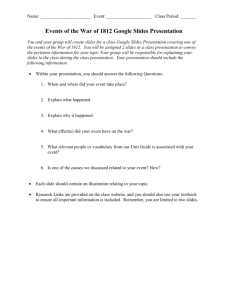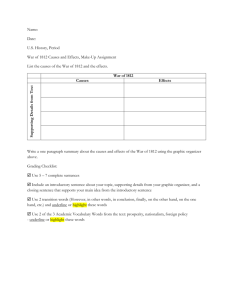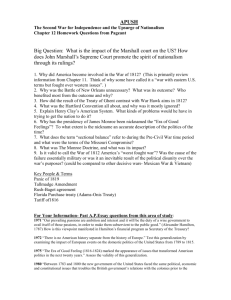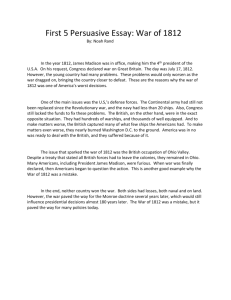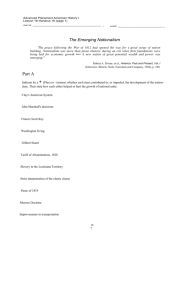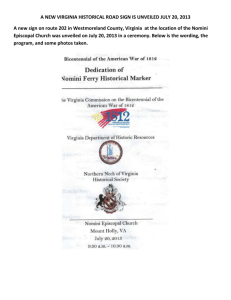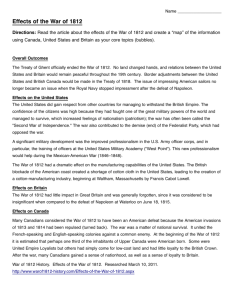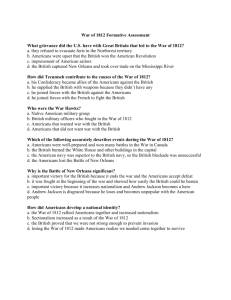US History Chapter 10 The War of 1812: Nothing Changes, but
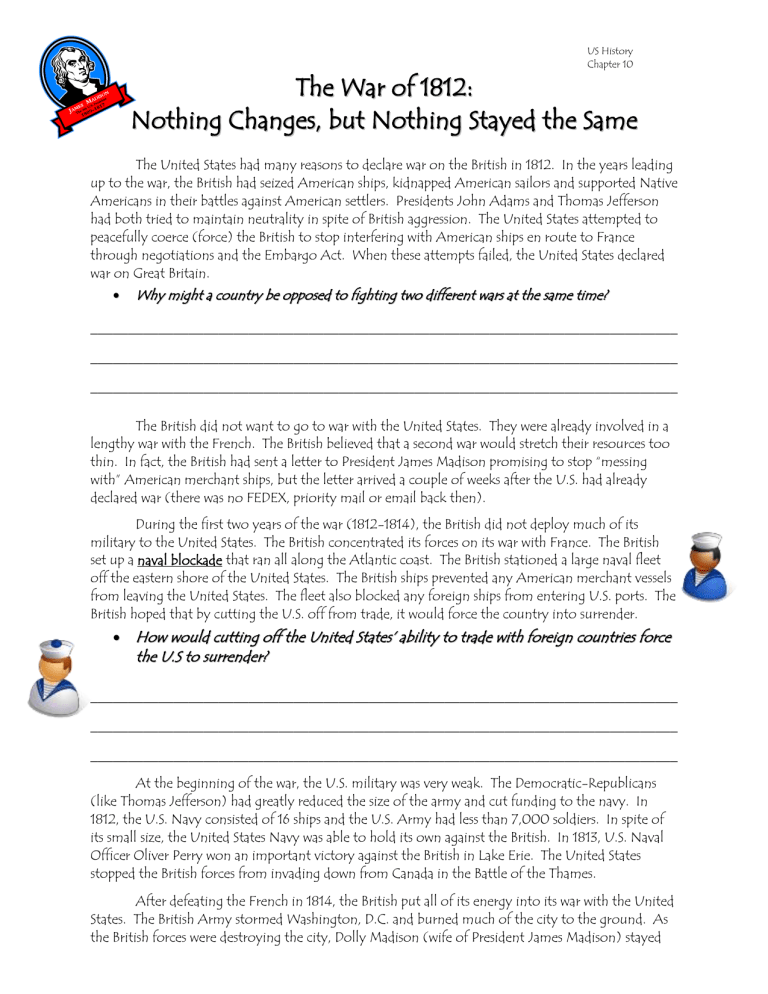
US History
Chapter 10
N o t t h i i n g C h a n g
T e s s h
, , e b
W u t t a r r
N o o t f t f h
1 1 i i
8 n
1 1 g
2 : :
S S t t a a y e d t t h e S S a m e
The United States had many reasons to declare war on the British in 1812. In the years leading up to the war, the British had seized American ships, kidnapped American sailors and supported Native
Americans in their battles against American settlers. Presidents John Adams and Thomas Jefferson had both tried to maintain neutrality in spite of British aggression. The United States attempted to peacefully coerce (force) the British to stop interfering with American ships en route to France through negotiations and the Embargo Act. When these attempts failed, the United States declared war on Great Britain.
W h y m i i g h t t a a c c o u n t t r r y b e o p p o s s e d t t o f f i i g h t t i i n g t t w o d i i f f f f e r r e n t t w a r r s s a a t t t t h e s s a m e t t i i m e ?
?
______________________________________________________________________________
______________________________________________________________________________
______________________________________________________________________________
The British did not want to go to war with the United States. They were already involved in a lengthy war with the French. The British believed that a second war would stretch their resources too thin. In fact, the British had sent a letter to President James Madison promising to stop “messing with” American merchant ships, but the letter arrived a couple of weeks after the U.S. had already declared war (there was no FEDEX, priority mail or email back then).
During the first two years of the war (1812-1814), the British did not deploy much of its military to the United States. The British concentrated its forces on its war with France. The British set up a naval blockade that ran all along the Atlantic coast. The British stationed a large naval fleet off the eastern shore of the United States. The British ships prevented any American merchant vessels from leaving the United States. The fleet also blocked any foreign ships from entering U.S. ports. The
British hoped that by cutting the U.S. off from trade, it would force the country into surrender.
t t
H h o e e w
U .
.
w
S o t u o l l s d s u c c r u r e t t t t n i i n d e g r r ?
o
?
f f f f t t h e U n i i t t e e d S S t t a a t t e e s s ’ ’ a b i i l l i i t t y t t o t t r r a a d e e w i i t t h f f o r r e i i g n c c o u n t t r r i i e e s s f f o r r c e e
______________________________________________________________________________
______________________________________________________________________________
______________________________________________________________________________
At the beginning of the war, the U.S. military was very weak. The Democratic-Republicans
(like Thomas Jefferson) had greatly reduced the size of the army and cut funding to the navy. In
1812, the U.S. Navy consisted of 16 ships and the U.S. Army had less than 7,000 soldiers. In spite of its small size, the United States Navy was able to hold its own against the British. In 1813, U.S. Naval
Officer Oliver Perry won an important victory against the British in Lake Erie. The United States stopped the British forces from invading down from Canada in the Battle of the Thames.
After defeating the French in 1814, the British put all of its energy into its war with the United
States. The British Army stormed Washington, D.C. and burned much of the city to the ground. As the British forces were destroying the city, Dolly Madison (wife of President James Madison) stayed
behind until the last minute to save as many historical artifacts (including a famous portrait of
President Washington) from the White House as she could.
After attacking Washington, DC the British moved to Fort McHenry near Baltimore,
Maryland. A gigantic American flag was flown over the fort. While the battle took place at Fort
McHenry, Francis Scott Key (an American lawyer who’d been captured) watched aboard a British ship.
At dawn, Key was relieved to see that the American flag was still flying above the fort. He was so proud of the United States that he wrote the following poem:
Oh say can you see by the dawn’s early light
What so proudly we hailed, at the twilight’s last gleaming
Whose broad stripes and bright stars through the perilous fight
O’er the ramparts we watched were so gallantly streaming
And the rockets red glare, the bombs bursting in air
Gave proof through the night that our flag was still there
Oh say does that star-spangled banner yet wave
O’er the land of the free and the home of the brave
His poem became the official national anthem of the United States 117 years later in 1931 (through an act of Congress).
In 1814 the British attacked the United States in the north and in the south. The British hoped to cut off New England from the rest of the country, but they were defeated by American forces. In the south, the British hoped to capture the port of New Orleans. American general Andrew Jackson defeated the British in January of 1815 (a month after the war had officially ended – but slow transportation and communication lines of the time prevented soldiers from knowing this at the time).
T h e E f f f f e c c t t s s o f f t t h e W a a r r
In December of 1814, the United States and Great Britain signed a peace treaty called the
Treaty of Ghent. Neither country admitted defeat in the peace treaty and no land was exchanged in through Treaty of Ghent. At the time most people described the results of the war using the Latin phrase “status quo ante bellum” which means “as things were before the war” (meaning nothing changed as a result of the war).
However the war did have a significant historical impact on the United States. The War of
1812 increased the sense of nationalism in our country. Nationalism refers to the pride that people have in their country. There was a sharp increase in patriotism as a result of the War of 1812.
Americans were proud of the fact that they were able to defeat the British (the world’s most powerful country at the time).
The War of 1812 also weakened Native American resistance to the westward expansion.
Without the support of the British, Native Americans became less likely to engage the United States in armed conflict. As Americans continued to develop the land they acquired through the Treaty of
Paris (1783) and the Louisiana Purchase (1803), Native Americans were pushed off of their land and they rarely fought against the U.S.
Lastly, the War of 1812 made the United States more independent. The British Blockade had prevented the United States from importing goods from Europe and Africa. Americans were forced to develop ways to make the products that they needed and wanted. The War of 1812 resulted in increased industrialization (more factories) and an increase in inventions.
Name: US History
Date:
Core:
R e v i i e w i i n g t t h e W a r r o f f 1 1 8 1 1 2
Directions: Use the handout ( War of 1812: Nothing Changes, but Nothing Stayed the Same ) to answer the following questions.
F a c t t C h e c k …
1.
Which of the following c c a u s s e d America to declare war on the British in 1812? a.
As a response to the British policy of impressment b.
Americans were angry that the British had seized their ships c.
Americans were angry that the British supported the Native Americans d.
All of the above
2.
True or False. The United States was the most powerful country in the world in 1812. That is the main reason why the British did not want to go to war with the United States back then.
I think that this statement is ________________ ( true or false ) because in the text it says: ___
______________________________________________________________________________
______________________________________________________________________________
3.
Which of the following best describes the U n i i t t e d S S t t a a t t e s s ’ ’ n a a t t i i o n a l l a a n t t h e m a.
The national anthem was written by a soldier in the American Revolutionary War. It describes the final Battle of Yorktown. b.
The national anthem was written by a young woman who watched the proceedings of the 1787 Constitutional Convention in Philadelphia. c.
The national anthem was written in 1931 by a survivor of the American Civil War. The man was named Francis Scott Key. d.
The national anthem was written by Francis Scott Key was he watched a battle during the War of 1812.
4.
Which famous n a t t i i o n a a l l l l a a n d m a a r r k b u r r n
____________________________________ e d t t o t t h e g r r o u n d during the War of 1812?
5.
Name the treaty that ended the War of 1812. _______________________________________
6.
T r r u e o r r F a a l l s s e effect on both Great Britain and the United States.
I think that this statement is ________________ ( true or false ) because in the text it says: ___
______________________________________________________________________________
______________________________________________________________________________
R e a d e r r R e s s p o n s s e . Briefly summarize the four paragraphs written below.
In December of 1814, the United States and Great Britain signed a peace treaty called the Treaty of Ghent. Neither country admitted defeat in the peace treaty and no land was exchanged in through Treaty of Ghent. At the time most people described the results of the war using the Latin phrase “status quo ante bellum” which means “as things were before the war” (meaning nothing changed as a result of the war).
However the war did have a significant historical impact on the United States. The War of 1812 increased the sense of nationalism in our country. Nationalism refers to the pride that people have in their country. There was a sharp increase in patriotism as a result of the War of 1812. Americans were proud of the fact that they were able to defeat the British (the world’s most powerful country at the time).
The War of 1812 also weakened Native American resistance to the westward expansion. Without the support of the British, Native Americans became less likely to engage the United States in armed conflict. As Americans continued to develop the land they acquired through the Treaty of Paris (1783) and the Louisiana Purchase (1803), Native Americans were pushed off of their land and they rarely fought against the U.S.
Lastly, the War of 1812 made the United States more independent. The British Blockade had prevented the United
States from importing goods from Europe and Africa. Americans were forced to develop ways to make the products that they needed and wanted. The War of 1812 resulted in increased industrialization (more factories) and an increase in inventions.
_____________________________________________________________________________________
_____________________________________________________________________________________
_____________________________________________________________________________________
_____________________________________________________________________________________
_____________________________________________________________________________________
_____________________________________________________________________________________
_____________________________________________________________________________________
_____________________________________________________________________________________
_____________________________________________________________________________________
_____________________________________________________________________________________
_____________________________________________________________________________________
S u m m a r y S c o r i i n g R u b r i i c
4
A d v a n c e d
Shows a deep understanding of the main idea of the text
All major details are included and paraphrased
Structure of summary mirrors the structure of the text
Includes no minor details and unnecessary opinions
Concludes with a statement that deeply connects to the main idea
3
P r o f f i i c i i e n t t
Shows a clear understanding of the main idea of the text
Most major details are included and paraphrased
Structure of the summary is very similar to the structure of the text
Includes no/few minor details and unnecessary opinions
Concludes with a statement that clearly connects to the main idea
2
D e v e l l o p i i n g
Shows a basic understanding of the main idea of the text
Some major details are included (may be in author’s words)
Structure of the summary is somewhat similar to the structure of the text
Some minor details and irrelevant opinions included
Concludes with a statement that somewhat connects to the main idea
1
B e g i i n n i i n g
Shows little/no understanding of the main idea of the text
Few major details are included and/or may be inaccurate
Ideas in summary not presented in the same format as the text
Includes many minor details and unnecessary opinions
Conclusion is missing or does not connect to main idea
